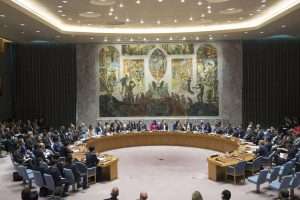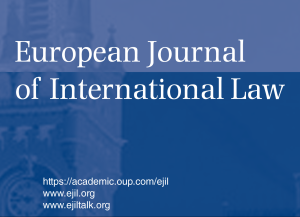
In the past two weeks, EJIL: Talk! featured analyses on the prohibition of the use of force, a reflection on the ongoing developments in the conflict between Israel and Hamas, and debates on the principle of non-intervention, trade, and recent judicial cases on climate change and migration. Additionally, the blog showcased a series of posts unpacking the contents of the latest issue of the European Journal of International Law.
The prohibition of the use of force
Marko Svicevic analysed the newly adopted UN Security Council Resolution 2699 (2023). The resolution authorizes a multinational security mission to Haiti and, according to Svicevic, marks a cautious return to the ‘Council’s traditional Chapter VII authorization model’, involving delegated enforcement action.
Alexander Lott delved into the ‘shadow war’ between EU and NATO member states and Russia, in which there are allegations of Russia targeting pipelines, cables, and windfarms linked to EU and NATO member states. Lott discussed the impact of acts of sabotage on the safety of critical offshore infrastructure and explored avenues to increase their legal resilience.
Emre Hayyar and Alexander Grimmig dissected a recent incident in Syria, where US forces downed a Turkish drone as it approached within 500 meters of a US military base in a region controlled by the Syrian Democratic Forces (SDF) in eastern Euphrates. They considered whether US forces stationed in Syria have the right to use force in self-defence, focusing, in particular, on a possible claim based on anticipatory self-defence.

Israel-Hamas conflict
Janina Dill centred on the actions of Hamas and the Israeli government. She raised two questions: whether anything is permissible when defending oneself against terrorists and whether anything is justified when resisting occupiers. Dill delved into the legal and moral dimensions of these inquiries, ultimately concluding with a reflection on the questions one should pose and answer in order to ‘channel our shared horror’.
The principle of non-intervention
Anh Nguyen discussed the European Parliament’s EU Anti-Coercion Instrument (ACI), which ‘rests on the presumption that the EU may undertake countermeasures against unlawful economic coercion by a third state against an EU member state or the Union itself’. Nguyen’s analysis centred on the concept of ‘economic coercion’ under the ACI, interpreted as a breach of the principle of non-intervention. She also examined whether the alleged coercive economic actions taken by China, which the ACI aims to address, fall under the ACI’s own definition of economic coercion.




Trade
Yoshimichi Ishikawa analysed China’s import ban on Japanese aquatic products, invoking concerns about potential radionuclide contamination. Ishikawa examined both the compatibility of China’s measure with the provisions of the SPS Agreement and Japan’s counterarguments submitted to the WTO.
Court cases on climate change and migration
Ole W Pedersen discussed the arguments raised in the recent oral hearings in Duarte Agostinho and Others v. Portugal and 32 others, one of the three climate change cases pending before the European Court of Human Rights’ Grand Chamber.
Tamás Molnár examined the first ruling of the General Court, acting as the first instance jurisdiction of the Court of Justice of the European Union, on the non-contractual liability of the European Border and Coast Guard Agency (Frontex) for damages caused to individuals by alleged violations of rights Frontex is bound to respect, protect, and fulfil.
New EJIL issue
The new issue of the European Journal of International Law is out (see the table of contents and abstracts here). Ana Luísa Bernardino, Orfeas Chasapis Tassinis, and Wanshu Cong walked us through the issue’s contents, including the articles and the pieces in the EJIL Debate, Roaming Charges, Critical Review of Governance, and the Last Page sections (see here). Gail Lythgoe and Christian Tams gave an overview of this issue’s five book reviews (see here).




Events and announcements
Finally, the events and announcements of the past two weeks can be found here and here.






